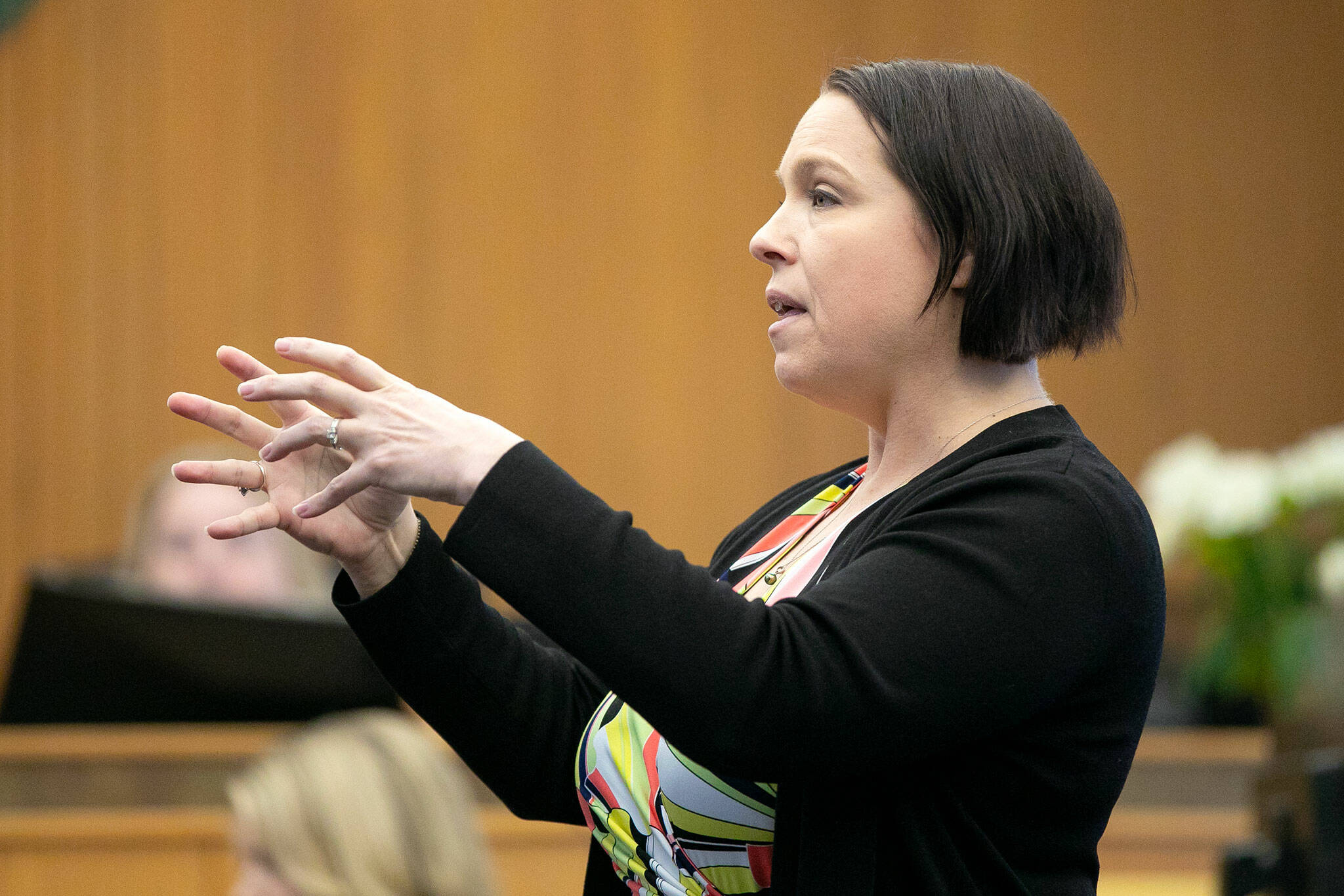The state Supreme Court on Monday responded to a “crisis” in Washington’s public defense system by slashing caseloads for those providing counsel to poor defendants facing criminal prosecutions.
Justices unanimously agreed to set the new statewide standards, which call for public defenders to handle a maximum of 47 felony cases or 120 misdemeanor cases in a year, depending on one’s primary area of practice. The current thresholds are 150 felonies and 400 misdemeanors.
The group that represents Washington counties says the new standards are unattainable with the level of funding now available and due to a shortage of lawyers.
Under the court’s interim order, the new caseload limits take effect Jan. 1, 2026 and should be achieved “as soon as reasonably possible” and no later than 10 years, Chief Justice Debra Stephens wrote in the four-page order.
“The crisis in the provision of indigent criminal defense services throughout our state requires action now,” Stephens wrote for the majority.
Monday’s decision is a potential game-changer in the state’s effort to shore up a beleaguered public defense system that struggles to provide timely, equitable and effective counsel.
“It’s a bold move. I didn’t expect justices to go this far,” said Larry Jefferson, director of the state’s Office of Public Defense.
Jefferson warned justices 18 months ago the system was on the “verge of collapse” as cases piled up, trials backed up and over-stressed attorneys retired or resigned to work in higher-paying, less stressful jobs. He appealed to the justices for help.
“This is one of the first times that public defenders have been listened to,” Jefferson said.
Some counties have had to release those accused of crimes due to the lack of available defense counsel. The ACLU of Washington sued Yakima County last year for failing to appoint attorneys for indigent people charged with crimes.
Hiring more public defenders costs money. Cities and counties worry they also will need to amp up hiring of court staff and prosecutors to keep pace and that will be expensive.
“What they are describing here is impossible with our current budget constraints,” said Derek Young, executive director of the Washington State Association of Counties. “There’s not nearly enough workforce now. If we triple the demand for services, where will all these lawyers come from?”
“There is no timeline we can accommodate this absent the Legislature waking up” and providing greater financial support, he said. The new state budget provides $20 million for counties, he said, which is about 6% of their total public defense costs.
The big picture
Standards the state Supreme Court adopted in 2012 said a full-time public defense attorney or assigned counsel should have no more than 150 felony cases a year.
In 2023, the American Bar Association, the National Center for State Courts and the RAND Justice Policy Program released the National Public Defense Workload Study. It concluded public defenders should handle far fewer cases.
That year, Washington’s high court asked the Washington State Bar Association to weigh in on whether the cap needed adjusting in light of the findings.
The association responded in March 2024, recommending new maximums of 47 felony credits or 120 misdemeanor credits in a year, depending on the severity of the charges. The reduction would be phased in over three years.
Under that approach, the cap for felony cases would be 120 in the first year, 90 in the second and 47 in the third. For misdemeanors, the limit would be 280 cases in the first year, dropping to 225 and then 120.
As part of its proposal, the association assigned crimes credits based on seriousness and complexity of providing a legal defense. A motor vehicle theft was assigned one credit and a murder seven, for example. That means a lawyer could theoretically be assigned 47 vehicle theft or seven homicide cases in a year before hitting their limit.
Such case weighting is “permissible and encouraged” but not required, Stephens wrote for the court. If done, a local government should adopt and publish any policies and procedures underlying the use of such weighting, Stephens wrote.
The Supreme Court started accepting public comment on the bar association’s request to trim caseloads a year ago, while also holding public hearings and internal work sessions.
In each hearing, prosecutors argued reducing caseloads would lead to filing of fewer cases to ensure no one’s rights to counsel are violated.
“Without sufficient attorneys or without sufficient resources, it would lead to a de facto decriminalization and an increase in vigilantism,” Russell Brown, executive director of the Washington Association of Prosecuting Attorneys, said in September. He added that “way too many” people have had their cases dismissed or not filed because of a lack of public defenders.
Supporters of reducing caseloads said in the hearings that the change is needed to stabilize the system. They contend that large caseloads and low pay are driving people out of public defense and deterring new lawyers from entering this line of legal work.
And they, too, pointed to the problem in some counties where those accused of crimes, but unable to afford a lawyer, can wait long periods of time before they receive counsel.
“Public defense is in a downward spiral. We can fix this,” said Jason Schwarz, director of the Snohomish County Office of Public Defense and chair of the Washington State Bar Association’s Council on Public Defense in September. “This will be expensive. Justice is not cheap.”
The order issued Monday isn’t the final word. New rules are needed to put the caseload figures in place. And the bar association made other recommendations on subjects like staffing and training that justices are still considering.
But the justices wanted to put out caseload information because they knew local governments are putting together their budgets for next year, Stephens wrote in the order.
Talk to us
> Give us your news tips.
> Send us a letter to the editor.
> More Herald contact information.

























